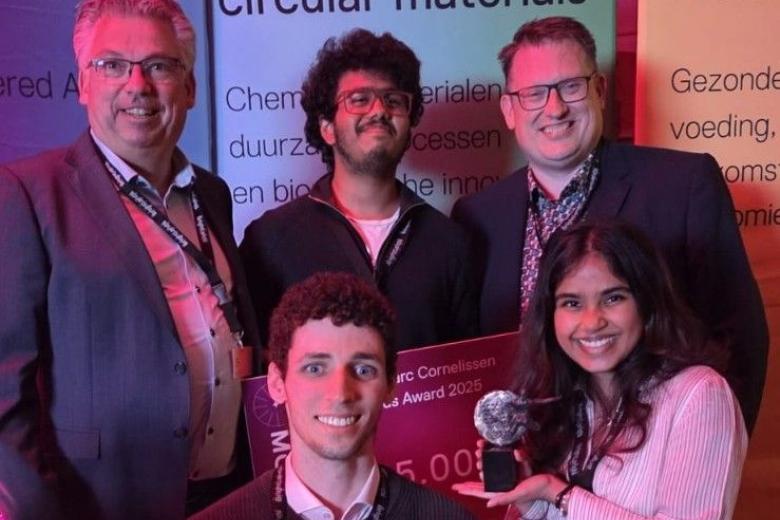MORSE PhD Workshop 2023
As part of its commitment to bring researchers with different topical and methodological backgrounds together, the Maastricht Observatory on Responsible, Resilient and Sustainable Societies, Economies and Enterprise (MORSE) organized the 3rd MORSE PhD Workshop on June 20 and 21. The workshop presented an opportunity for PhD students at Maastricht University’s School of Business and Economics to share and discuss work at every stage of the research process. In turn, the PhDs received valuable feedback from senior MORSE members other than their own supervisors, as well as from other PhD students. We look back at constructive discussions, thought-provoking questions and comments, and plenty of opportunities to broaden our horizons and gain new perspectives on our research.
Photo's PhD Workshop
Kicking off the show in the afternoon of the first day was Janek Kretschmer who reported on the results of an experimental study on giving pledges and the cost-effectiveness of charities. In this study (which he was able to conduct with funding support from MORSE) he shows that the cost-effectiveness of donations can be increased if the decision of how much to donate is separated from the decision to whom to donate. Thus, giving pledges are a means to increase donations to more cost-effective causes.
The second presenter was Anmol Soni who introduced the audience to his PhD project on the complex interplay between the public, governments, and industry when it comes to the attribution of climate events and policies. Anmol leveraged the combined wisdom of his audience by engaging them in a fruitful discussion on how best to measure and decode the public perception of climate events.
The next presentation saw Prescott Morley present his work on income inequality, social comparisons, and the shape of the expenditure cascades. Although we might not like to admit it, we all compare ourselves to our peers in some way or another and this affects the way we consume. Prescott demonstrated what different ways of conceptualizing these social comparisons in agent-based models mean for aggregate consumption at a macroeconomic level.
Closing the first half-day of the workshop, Eoghan O’Connell discussed his ongoing research on labour heterogeneity and the energy transition. While it is clear that a transition to a carbon-neutral production of energy is imperative, and many researchers engage in the question of how to implement this transition in a smooth way, Integrated Assessment Models still have a blind spot when it comes to the adequate alignment of labour markets.
The first day of the workshop was then rounded off with a little get-together to continue the discussion in an informal setting and relaxed atmosphere.
The second day started with a presentation by Vinzenz Peters on the role of local banks in economic resilience to extreme weather shocks in the US. He demonstrated that – in the face of increasing losses caused by these events – local financial institutions, such as community banks, play an important role in enabling communities to minimize contingent employment losses. His results suggest there may be a trade-off between efficiency and resilience when it comes to the optimal structure of the banking sector.
Siavash Mohades continued by presenting his work on measuring economic uncertainty at different levels: the firm, the sector, and the aggregate economy. Uncertainty represents a crucial challenge for firms – especially during times of (unprecedented) crises and for firms that are still relatively small, young, and capital intensive. The method introduced by Siavash and his co-authors presents a new way of decomposing firms’ uncertainty into its different components and can be applied in any geographical context using firm-level data.
Next, Mariët Bogaard presented her work on the effects of the COVID-19 pandemic on students’ performance in higher education. Her results, based on comprehensive data on the test scores of Dutch medicine students, suggest that students were on average resilient to the COVID shock in the sense that the average students’ test scores did not show a substantial decrease. However, COVID has increased the variance in students’ performances, meaning that some students were better able to adapt to COVID than others.
Completing the line-up, Leon Gnad used the workshop to pitch the research plans for his PhD project on team learning and team adaptation in the workplace. By leveraging existing methods and knowledge of how teams learn, he strives to explore the ways in which teams adapt to unforeseen challenges and events. The audience acknowledged his interesting presentation by entering into a stimulating final discussion.
Overall, the workshop proved to be a worthwhile and exciting event for junior and senior researchers alike. We thank all presenters, discussants, and attendees for contributing to the fun and productive sessions. We are looking forward to seeing you again at the 4th edition of the MORSE PhD Workshop in 2024!
Also read
-
Roy Broersma (CEI): Guiding Aestuarium from idea to venture
Roy Broersma, director of the Center for Entrepreneurship & Innovation (CEI) at SBE, has been closely involved in guiding Aestuarium from an early student startup to a growing venture. From spotting their potential during the Brightlands Startup Challenge supporting them through CEI.
-
Despite a less tight labour market no end to shortages in healthcare, education, and tech
Interesting new findings in the report 'The Labour Market by Education and Occupation until 2030' from the Research Centre for Education and the Labour Market (ROA) at Maastricht University.
-
Teacher Information Points at UM
UM faculties now host Teacher Information Points (TIPs) that offer local, “just-in-time” and on-demand support for teaching staff. The aim is simple: to provide help that is closely connected to day-to-day teaching practice.